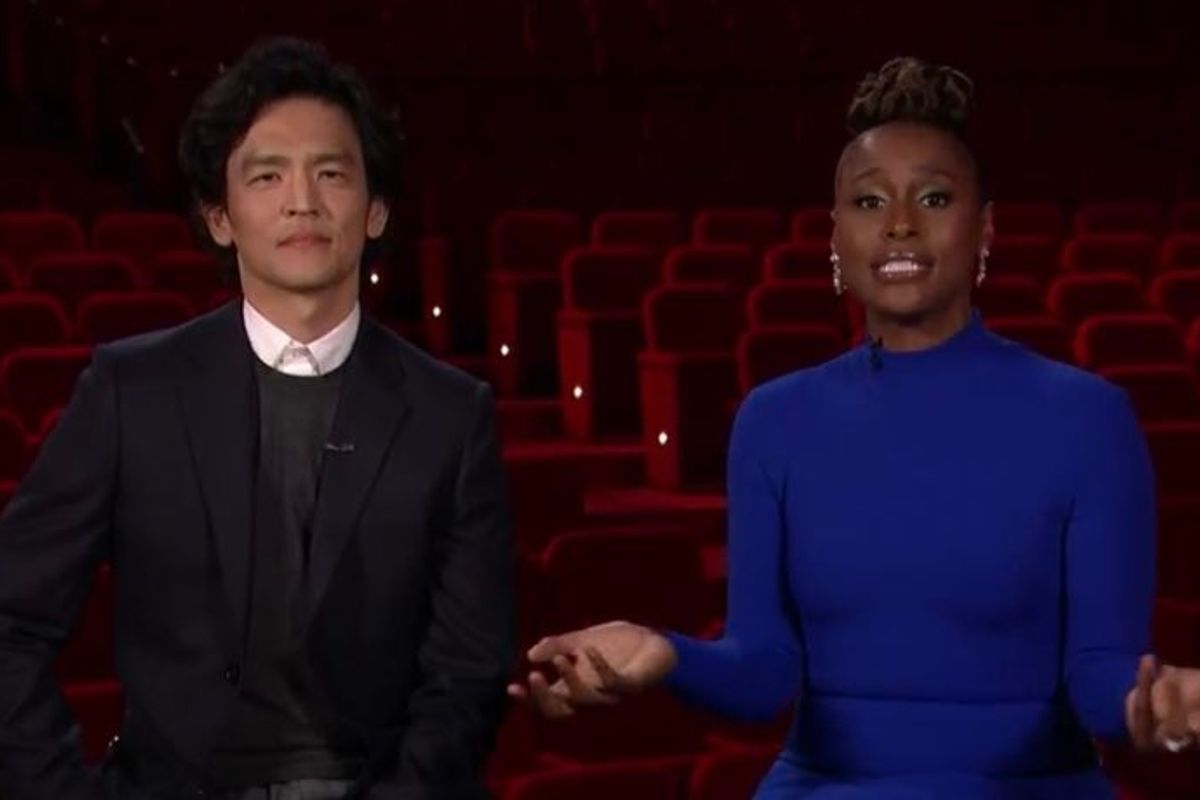There were a couple of history making moments in this year's Oscar nominations. For the first time ever, a streaming service had more nominations than a traditional studio. Boon Jong-Ho's Parasite made history as the first-ever best picture nomination for a Korean film. But when it comes to nominating female directors and people of color, it's business as usual.
Issa Rae said what a lot of us are feeling when she announced the nominees alongside John Cho. After reading the all-male nominees for best picture, Rae deadpanned, "Congratulations to those men." Bong Joon-Ho was the only director of color nominated.
It's surprising that women were shut out of the Best Director category, considering we've the highest number of female directors in over a decade. A study by the USC Annenberg Inclusion Initiative found that, 10.6% of the top movies were directed by women in 2019.
There were so many women who were discussed as possible contenders for the Oscar. Greta Gerwig (Little Women), Lulu Wang (The Farewell), Marielle Heller (A Beautiful Day in the Neighborhood), Lorene Scafaria (Hustlers), Kasi Lemmons (Harriet), Alma Har'el (Honey Boy), Jennifer Lee (Frozen II), Melina Matsoukas (Queen & Slim), and Olivia Wilde (Booksmart) are just some of the women who could have been nominated for the award. But at the end of the day, the nominations contained a lot of familiar (and male) names.
Some people think that female directors didn't get a fair shot. "It's a completely unconscious bias. I don't think it's anything like a malicious rejection," Amy Pascal, who produced Little Women, told Vanity Fair. "I don't think that [men] came to the screenings in droves, let me put it that way," Pascal said. "And I'm not sure when they got their [screener] DVDs that they watched them."
The Oscars have a pretty bad track record when it comes to female directors. In the 92-year history of the Academy Awards, only five women have been nominated for Best Director. Kathryn Bigelow made history in 2009 when she became the only woman to win an Oscar for directing The Hurt Locker.
The lack of inclusion in this year's Oscars was highlighted in the acting nominees, making it another year of #Oscarssowhite. Cynthia Erivo was the only person of color nominated for an acting award for her portrayal of Harriet Tubman in Harriet.
And it's not because there wasn't anyone else worthy of being nominated. Jennifer Lopez had Oscar-buzz around her for her role in Hustlers. Lupita Nyong'o for her role in Us and Eddie Murphy for his portrayal of Rudy Ray Moore in My Name is Dolemite were other possible Oscar contenders. But they didn't even nominate Awkwafina, who won a Golden Globe for her performance in The Farewell.
People on Twitter weren't happy about the nominations (and the snubs).
It would be one thing if the Academy had no other options besides Martin Scorsese and Quinten Tarantino, but that's not the case. We don't live in a world where only one voice gets to speak. We're hearing many stories from many different voices. It's time award shows enter the 21st century and give other voices a shot.
- Jennifer Lopez, Adam Sandler and Biggest Oscar Snubs – Variety ›
- Oscar nominations 2020: Biggest snubs, from Jennifer Lopez to ... ›
- Oscar Snubs and Surprises: Jennifer Lopez, 'Frozen II,' Female ... ›
- 92nd Oscar Nominations - YouTube ›
- Oscar Nominations Presenter Issa Rae Calls Out Female Directors ... ›
- Issa Rae Calls Out The Lack Of Women Nominated For Best Director ... ›
- Oscar Nominations Presenter Issa Rae Calls Out Female Directors ... ›
- Watch the Oscar Nominations 2020 Live Stream: 92nd Academy ... ›
- Oscar Nominations 2020: Issa Rae Calls Out All-Male Directors ... ›
- Oscar Nominations 2020 Announcement Date & Time - Oscars 2020 ... ›
- Issa Rae's 'Congratulations to those men' quip sums up Oscars ... ›
- Issa Rae Reacting to the 2020 Oscars Snub Is Flash Point | Time ›
- Oscar Nominations 2020: 'Joker' and 'Irishman' Lead the Nominees ... ›
- Oscar Nominations: 'Parasite' Joins 'Joker,' 'The Irishman,' And 'Once ... ›
- 2019 | Oscars.org | Academy of Motion Picture Arts and Sciences ›
- 92nd OSCARS SHORTLISTS | Oscars.org | Academy of Motion ... ›
- Oscar Nominations 2020: The Complete List - 92nd Academy Awards ›

